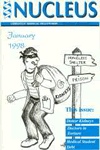As students of biological science, medics are also deemed objective. However, very few doctors enter medicine without personal agendas: secure careers, high salaries and status. Not many doctors work solely for the promotion of health.
We like to talk of 'impartial opinions' but rarely are we totally objective. Still, most research is undertaken for good reasons: to discover cures for deadly diseases or decide which surgical procedure is best. Scientists are invited to declare anything that could be construed as bias. This way anyone reading a research paper can consider the findings in the light of the authors' declared conflicts of interest.
Occasionally, however, we come across research that is blatantly biased. Recently, a leaked memo showed that tobacco companies had been heavily funding amenable scientists.
Subsequently, biased research into the effects of passive smoking was carried out.[1,2] When released by the popular press, what effect does such data have on the general public?
In the 1940s and 50s, a scientist called Alfred Kinsey carried out some extraordinary research into human sexuality. Sexual Behaviour in the Human Male,[3]the product of his labours, declared to America that one in ten men was homosexual. This hugely inflated figure stood as fact for many years until squashed down to 1% by recent researchers.[4] Even today, many people in the lay public still believe it to be true. Heading up his own institute in Bloomington, USA, Kinsey enjoyed the financial backing of the Rockefeller Foundation. They saw him as an objective scientist. Actually, known only to close senior colleagues, he had a personal agenda, which he wrote into his research. Kinsey was in fact bisexual, as were many of his senior employees. His biographer describes a sexual Utopia at the institute, where promiscuity and wife-swapping were encouraged.[5]
Through biased research and personal comments, Kinsey altered what society deemed normal and right. According to Billy Graham, he 'did more to undermine morality than any other American'.
As Christians we expect our beliefs to conflict with those of our peers in many areas. Abortion, cloning, fertility treatments and sexuality - the scope for debate is almost endless. It is a great privilege to be involved in research and to 'think God's thoughts after him'. Even as students, we all have opportunities to publish papers and so have a positive influence on scientific thinking. Yet, we need to recognise and be honest about our own conflicts of interest. Not only that, we must not emulate Kinsey by writing our conclusions before we start collecting the data.
































